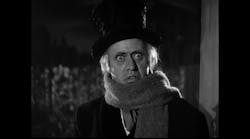I’ve decided to embrace the spirit of Ebenezer Scrooge this Christmas, and I hope you’ll join me.
A Christmas Carol was written by Charles Dickens and first published on Dec. 19, 1843. It is barely 11,000 words—by comparison, War and Peace is more than 587,000 words. Yet the impact A Christmas Carol has had on the world has been significant in the intervening 179 years.
It also created a word in English language lexicon: scrooge. The Cambridge Dictionary defines a scrooge as “someone who spends as little money as possible and is not generous.” This is a fundamentally unfair definition, as we shall explore.
The story has been retold and staged on countless occasions and in a variety of forms. The role of Scrooge has been performed by everyone from George C. Scott to Albert Finney to Michael Caine, who had to share his billing with the Muppets. But the definitive performance of Ebenezer Scrooge was created by Welsh actor Alastair Sim in the 1951 film "Scrooge."
The film itself could have been filmed 20 years earlier—or 100 years earlier, for that matter. It is a black-and-white, gritty, dark world that Scrooge wallows in throughout the film. We see a story authentically in the time of Dickens, almost as if an ancient kinescope has slipped through a worm hole in time.
Sim’s portrayal of Scrooge is equal parts grasping miser and bitter man—bitter at the fates that robbed him of love and companionship. In return, he has abandoned hope and closed himself off from his fellow man. Scrooge is left with only business and money, two institutions that seldom return the affection they are given.
In the time is forced to confront his past and present and contemplate his future, he insists that he is not unmoved by what he sees, but is too old to change his ways. Only when he is confronted by the Ghost of Christmas Yet To Come at the end of his Christmas Eve odyssey does he conclude that such inaction would lead to calamity for one small boy and to indifference from those with whom he shared the world. His existence as a man will have accounted for nothing.
He prays there is time for atonement, and in redemption, he seeks hope. “I know that men’s deeds foreshadow certain ends,” Sim says as Scrooge, desperation and fear etched in his face, “but if the deeds be departed from, surely the ends will change.”
And it is in that moment that Scrooge is transformed from miser to mentor. In his redemption, he freely gives to all around him. Money, as it turns out, is just a means to that end. For his nephew, long disowned because he married a penniless woman, the transformed Scrooge visits on Christmas Day and asked for absolution. “Can you forgive a pig-headed old fool for having no eyes to see with, no ears to hear, all these years?” he asks of his nephew’s wife.
He saves the greatest gift for his much-abused clerk Bob Cratchit, promising help for his family, and for his son Tiny Tim in particular. “I haven’t taken leave of my senses, Bob,” Scrooge tells Cratchit at the end of the film “I’ve come to them. From now on, I’d like to try to help you to raise that family of yours—if you’ll let me.”
In the end, the Ebenezer Scrooge we are told about in story and film is a changed man—not just in his view of the world, but in his view toward his fellow man. As Dickens wrote, “Scrooge was better than his word. He did it all, and infinitely more; and to Tiny Tim, who did NOT die, he was a second father. He became as good a friend, as good a master, and as good a man as the good old city knew, or any other good old city, town, or borough in the good old world. … and it was always said of him, that he knew how to keep Christmas well, if any man alive possessed the knowledge.”
Those are attributes we all should aspire to. If Scrooge is an aberration in how we behaved at the start of the story, he is sadly no less unique in his behavior at the end. The man Ebenezer Scrooge was at the end of the story is a man to be admired and emulated. The word “scrooge” unfairly discredits him, and the spirit by which he lived the rest of his life.
I promise this Christmas to do my best to be a scrooge, in the way I hope it is now redefined. In sharing this idea, I hope to encourage others to reflect on the lessons of Scrooge and to do likewise.
And God bless us, everyone.

